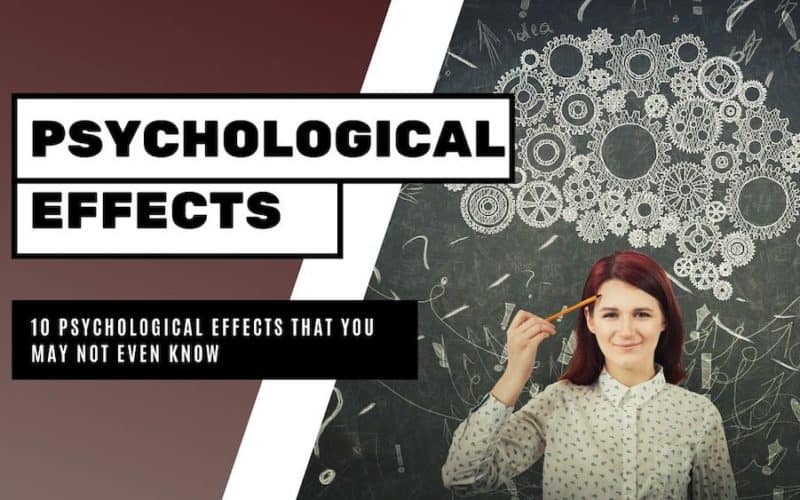Have you ever reflected on your actions, and wondered why you behaved in a certain way? Understanding the psychological effects behind our actions is essential for self-improvement. So, in this article, we will discover ten psychological effects that you may not even know are affecting you.
There are so many researches that has been done to find out about the rationality behind our everyday decisions. Base on those researches we have gathered ten psychological effects that influence millions of people.
Psychological Effects That You May Not Even Know:
1. The Bystander effect
Have you ever noticed a person calling out for help from a crowd at a public place? And do you find yourself looking towards others, assuming them to be the first ones to help? Everyone seems towards others to know how to react. This is a perfect bystander effect example.
The Bystander effect is a social psychological phenomenon when individuals are less likely to offer help to a victim when other people are present.
Due to this mindset, the person may not even get the required help. The best use of this psychological effect is that; when you are in a public place, it is better to ask for help personally than to call out to a crowd.
2. The Paradox of choice
According to this psychological effect, there will be a constant feeling that you could’ve chosen better. Psychologist Barry Schwartz explains in his book, The Paradox of Choice, that your happiness also decreases with the extra effort put into weighing multiple options. Barry Schwartz, mention that
Eliminating consumer choices can greatly reduce anxiety for shoppers.
We are often under the impression that we can make a better decision if offered more excellent choices. But this is not true. Everyday choices such as choosing where to eat, buying a new phone or applying for a job can become more complicated and overwhelming when offered a plethora of options.
You’ll find it harder to feel content after choosing. But, fair not because you are not alone who only feels like this. Every day, this psychological effect influences millions of people.
3. The Hawthorne effect
According to this psychological theory, people tend to modify their behavior when being observed. This is why they can behave differently when part of an experiment or study. You will often find employees in an office working more productively when the manager or boss is on rounds.
4. The Veblen effect
Do you ever find yourself wanting to buy a product just because it is expensive? This psychological phenomenon is known as the Veblen Effect.
One study found out that, people tend to associate better quality and a show of superior status at a higher price. It explains your desire to buy luxurious cars and designer clothes.
Moreover, it is also why universities with a higher tuition fee are considered to offer better quality education. By using this psychological effect, marketers always trying to influence millions of people every day.
5. The Pygmalion effect
This psychological theory explains that people are likely to perform up to the level expected of them. Ideally, this would mean that positive expectations would yield positive results. This can bring results for both, personal and team growth.
You can aim for higher goals. In turn, you’ll find yourself working harder to meet your expectations. And as a leader of a team, you will observe improved performances when you set higher expectations.
6. The Spotlight effect
Have you ever felt that all eyes in a room are on you? Or that you’re always being scrutinized in a public place? If you are having a bad hair day, you may feel that everyone around you noticed and made fun of you?
This is the ‘Spotlight Effect,’ which refers to the likelihood of thinking that quite a lot of people see your actions and mistakes. According to this psychological theory, you tend to overestimate the number of people who do.
This is major because we use our own experiences and perceptions to evaluate other people. If you want to feel good and confident, then it is advised to ignore these effects.
7. The Pratfall effect
Humans are not perfect and tend to make mistakes. When we see people making mistakes and laughing it off, we tend to find their personality attractive and confident.
This psychological theory explains that, people who make a mistake more relatable to us, versus those who always act to be perfect.
8. The Zeigarnik effect
It is often observed that people tend to recall incomplete tasks more efficiently than complete ones. The effect of interruption on memory was experimented on by the psychologist, Bluma Zeigarnik in 1927.
She set up an experiment in which she asked each participant to complete specific tasks, such as solving a puzzle. During some tasks, the participants were interrupted by the supervisors. While they were allowed to complete the remaining ones without interruption.
Afterward, Zeigarnik asked the participants to recall details of the tasks. She found that participants remembered details of interrupted tasks around 90% better than those which they completed without uninterrupted.
This suggests that your brain notably retains information about incomplete tasks. And once completed, the brain allows you to forget it.
9. The Anchoring effect
This is a form of cognitive bias in which people tend to make decisions keeping in mind the first piece of information known to them. This psychological effect is quite often used in the sales department. You will be more inclined towards buying a pair of jeans on a 20% sale.
Or you will feel accomplished after bargaining and purchase an item at a price lower than the tag price. In both cases, you feel content as you are paying lower than the initial price (the ‘anchor’ in this case).
10. The Focusing effect
There are many aspects to consider when making a decision. But sometimes while doing so, we tend to focus on just aspect and ignore the rest. This could be because limited information is available to us. Or it could just be a faulty assumption on our part.
Some people tend to overestimate the impact of increased income on happiness. They ‘focus’ on the increased amenities that will be available to them. But by doing so, they tend to ignore stress and busier lifestyles that come with an increased income.
After reading ten psychological effects that influence millions of people, you will be able to identify some of the psychological reasons behind your decisions and actions. And hopefully, you’ll now be able to work on improving those decisions consciously.





